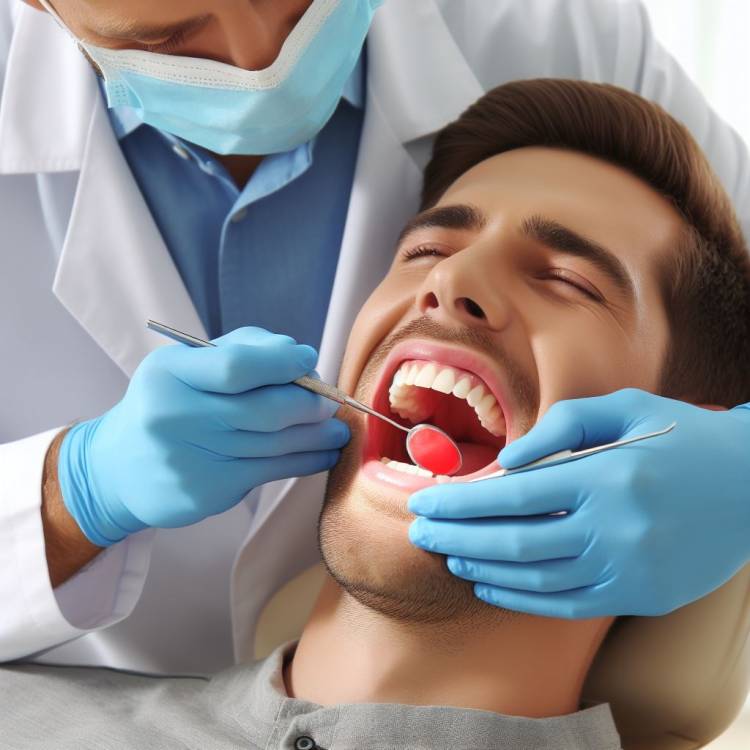In the intricate world of oral health, the significance of maintaining a strong foundation often gets overshadowed. Periodontitis, a group of inflammatory diseases affecting the supporting tissues of the tooth, poses a significant threat. With the periodontium comprising the gingiva, alveolar bone, and periodontal ligaments, any disturbance can lead to serious consequences.

Periodontitis, a group of inflammatory diseases affecting the tooth-supporting tissues (periodontium), poses a significant global health concern. With four key components – gingiva, alveolar bone, and periodontal ligaments – the periodontium’s health is crucial for overall well-being. Gingivitis, often triggered by bacterial biofilm (dental plaque), is the initial stage, marked by red, swollen gums that bleed easily. If left untreated, it progresses to periodontitis, leading to the loss of connective tissue and bone support, a major contributor to adult tooth loss.
The Global Impact
Periodontal diseases, including the milder form known as gingivitis, affect a staggering 90% of the worldwide population. Gingivitis, fueled by bacterial biofilm (dental plaque), manifests in red, swollen gums that tend to bleed easily. The critical aspect, however, is that gingivitis is reversible and doesn’t harm the underlying tooth structures.
The Gateway to Periodontitis
When left untreated, gingivitis can progress to periodontitis, a condition resulting in the loss of connective tissue and bone support. Notably, periodontitis stands as a major cause of tooth loss in adults. Beyond the microbial culprits in biofilm, genetic and environmental factors play a substantial role. Among these, tobacco use emerges as a significant, modifiable risk factor.
The Tobacco Influence
When left untreated, gingivitis can progress to periodontitis, a condition resulting in the loss of connective tissue and bone support. Notably, periodontitis stands as a major cause of tooth loss in adults. Beyond the microbial culprits in biofilm, genetic and environmental factors play a substantial role. Among these, tobacco use emerges as a significant, modifiable risk factor.
Mechanisms Behind the Impact of Smoking
Understanding how smoking affects periodontal health has been a long-standing challenge. Recent studies shed light on alterations induced by tobacco smoke in the lipid A structure, reducing the inflammatory potential of the oral microflora. Despite increased infection risks, smokers paradoxically exhibit reduced clinical inflammation, presenting a clinical puzzle.
The P. gingivalis Connection
Exposure to tobacco smoke extract influences the major fimbrial antigen in P. gingivalis, promoting dual-species biofilm formation. Surprisingly, these biofilms show a lower pro-inflammatory capacity, suggesting that P. gingivalis adapts to environmental stress induced by tobacco smoke.
Treatment Challenges
In vitro studies reveal that smokers experience altered gingival crevicular fluid inflammatory cytokine profiles, immune cell function, and proteolytic regulation. This immunosuppressive effect contributes to an increased susceptibility to periodontitis. Periodontal treatment, including regenerative and soft tissue grafting procedures, tends to be less successful in smokers than non-smokers.
Summing Up!
In vitro studies reveal that smokers experience altered gingival crevicular fluid inflammatory cytokine profiles, immune cell function, and proteolytic regulation. This immunosuppressive effect contributes to an increased susceptibility to periodontitis. Periodontal treatment, including regenerative and soft tissue grafting procedures, tends to be less successful in smokers than non-smokers.
Moving Forward:
Treating patients with periodontal disease demands a nuanced approach, delving into the intricate relationship between genetic predisposition and environmental factors. Only through an individualized strategy can we identify our patients’ risks and achieve more promising outcomes.
FAQs
What is periodontitis?
Periodontitis is a group of inflammatory diseases affecting the supporting tissues of the tooth, including the gums, alveolar bone, and periodontal ligaments.
How prevalent are periodontal diseases globally?
Periodontal diseases can affect up to 90% of the worldwide population, making them highly prevalent.
What is gingivitis, and what causes it?
Gingivitis is the mildest form of periodontal disease, caused by the accumulation of bacterial biofilm (dental plaque) on teeth near the gums.
What are the symptoms of gingivitis?
Symptoms of gingivitis include red, swollen gums that may bleed easily. However, gingivitis does not impact the underlying supporting structures of the teeth and is reversible.
How does gingivitis progress to periodontitis?
If left untreated, gingivitis can advance to periodontitis, resulting in the loss of connective tissue and bone support, ultimately leading to tooth loss in adults.
What role does tobacco use play in periodontal diseases?
Tobacco use is a modifiable risk factor that significantly influences the development, progression, and treatment outcomes of periodontal diseases.
How does smoking impact periodontal health?
Smoking is an independent risk factor for the initiation, extent, and severity of periodontal disease. It can also lower the chances of successful treatment.
What is the relationship between smoking and periodontal disease progression?
Studies show a direct correlation between smoking and increased clinical attachment loss and alveolar bone loss, indicating a higher risk of developing periodontal disease.
How does smoking affect the oral microflora and immune response?
Smoking induces alterations in 3-OH fatty acids present in lipid A, leading to changes in the oral microflora with reduced inflammatory potential and immunosuppressive effects.
Why is periodontal treatment less likely to be successful in smokers?
Smokers exhibit reduced success rates in various periodontal procedures, including regenerative and soft tissue grafting procedures, highlighting the challenges posed by smoking in achieving optimal treatment outcomes.
PRISTINE SMILES DENTAL CARE JUHU
1, Jayanti Niwas, opp. Vaishali Hotel, near Iskcon Temple, Jukarwadi, Juhu, Mumbai, Maharashtra 400049

